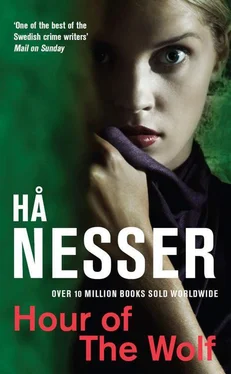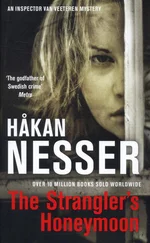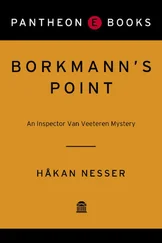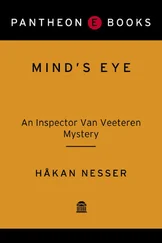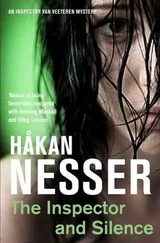Hakan Nesser - Hour of the wolf
Здесь есть возможность читать онлайн «Hakan Nesser - Hour of the wolf» весь текст электронной книги совершенно бесплатно (целиком полную версию без сокращений). В некоторых случаях можно слушать аудио, скачать через торрент в формате fb2 и присутствует краткое содержание. Жанр: Полицейский детектив, на английском языке. Описание произведения, (предисловие) а так же отзывы посетителей доступны на портале библиотеки ЛибКат.
- Название:Hour of the wolf
- Автор:
- Жанр:
- Год:неизвестен
- ISBN:нет данных
- Рейтинг книги:5 / 5. Голосов: 1
-
Избранное:Добавить в избранное
- Отзывы:
-
Ваша оценка:
- 100
- 1
- 2
- 3
- 4
- 5
Hour of the wolf: краткое содержание, описание и аннотация
Предлагаем к чтению аннотацию, описание, краткое содержание или предисловие (зависит от того, что написал сам автор книги «Hour of the wolf»). Если вы не нашли необходимую информацию о книге — напишите в комментариях, мы постараемся отыскать её.
Hour of the wolf — читать онлайн бесплатно полную книгу (весь текст) целиком
Ниже представлен текст книги, разбитый по страницам. Система сохранения места последней прочитанной страницы, позволяет с удобством читать онлайн бесплатно книгу «Hour of the wolf», без необходимости каждый раз заново искать на чём Вы остановились. Поставьте закладку, и сможете в любой момент перейти на страницу, на которой закончили чтение.
Интервал:
Закладка:
‘Disappeared?’
‘We know what that could imply,’ said Reinhart curtly. ‘It’s not too difficult to guess what might have happened. Aron Keller flew to New York last Saturday. He’s no longer in the hotel where he checked in — we’ve exchanged a few faxes with them. We don’t know where Pieter Clausen is. There’s no trace of him, but it doesn’t look as if he’s done a runner as well. His passport and even his wallet are still in his house. I have only one theory, and that is that… well, that Keller has done him in. Killed him and buried him somewhere. Unfortunately. I’m afraid… I’m afraid you might never come face to face with your son’s murderer.’
Van Veeteren took a swig of beer and looked out of the window. Half a minute passed.
‘What we can hope for is that we find his body in due course,’ said Reinhart, and wondered immediately why he had said that. As if that would be some kind of consolation.
Making contact with the body of the man who has killed your son? Absurd. Macabre.
Van Veeteren said nothing. Reinhart studied his own hands, and searched in vain for something to say.
‘I have a photo of him,’ he said in the end. ‘So you can take a look at him, if you’d like to. And Keller as well, come to that.’
He took two photocopies out of his briefcase and handed them over. The Chief Inspector looked at them for a few moments, frowning, then handed them back.
‘Why would Keller have killed him?’ he asked.
Reinhart shrugged.
‘I don’t know. He must have got the money, otherwise he would hardly have been able to slope off to New York. That’s what I reckon, at least. You can indulge in a bit of speculation, of course. Maybe Clausen discovered his identity somehow or other. Keller is a very odd customer… And he knew that Clausen wouldn’t hesitate to kill. So he played it safe, as simple as that. If Clausen knew who the blackmailer was, Keller must have realized that he was living dangerously.’
Van Veeteren closed his eyes and nodded vaguely. Another half a minute of silence passed. Reinhart abandoned his awkward efforts to find something positive to say, and instead tried to imagine how The Chief Inspector must be feeling. Naturally enough he had been doing that all the time, more or less; but it wasn’t any easier now that he started concentrating on it. Having his son murdered, that was bad enough; and then the murderer being swept out of the way by another evildoer, who in a way was just as guilty of Erich’s death as the man who had actually killed him. Or was that not an acceptable way of looking at it? Did it matter? Did such considerations have any significance when it was your son at the heart of the matter?
He didn’t find an answer. Didn’t come anywhere near finding an answer.
Whatever, no matter how you looked at it, Erich Van Veeteren had been no more than a pawn in a game that had nothing to do with him. What a pointless way to die, Reinhart thought. A completely wasted victim. The only one who could have conceivably benefited from his death was Keller, who presumably raised the price for his black arts once Clausen had another death on his conscience.
What a bloody mess, Reinhart thought for the fiftieth time that day. The choreographer of the nether regions had struck again.
‘What are you going to do now?’ asked Van Veeteren.
‘We’ve issued a Wanted notice in the USA for Keller,’ said Reinhart. ‘Of course. Maybe one of us will have to go over there sooner or late… But it’s a big country. And he’s got enough money to see him through for quite a while.’
Van Veeteren sat up straight and looked out of the window again.
‘It’s snowing hard now,’ he said. ‘Anyway, many thanks. You’ve done all you could. Maybe we can keep in touch — I’d like to know how things go.’
‘Of course,’ said Reinhart.
When he left The Chief Inspector alone at the table, he felt like crying for the first time in twenty years.
35
He spent Wednesday evening and half of Thursday in an old Art Nouveau-style mansion in the Deijkstraat district. Krantze had bought the whole of a private library on the owner’s death: in round figures there were four-and-a-half thousand volumes to be examined, assessed and packed into crates. As usual there were three categories to be considered: books that would be hard to sell and of doubtful value (to be sold off by the kilo); books worthy of a place on the shelves of the antiquarian bookshop that would no doubt find a buyer in due course (no more than two to three hundred in view of available shelf space); and books he would love to see in his own bookcase (five at most — over time he had learned to transform moral questions into unambiguous numbers).
It was no unpleasant task, wandering around this old bourgeois mansion (the family had been lawyers and appeal judges for several generations, if he had read the genealogy correctly), thumbing through old books. He could take as long as he needed — the hereditary gout that now afflicted Krantze prevented him from doing work that could not be carried out while sitting down. Or lying down. Naturally he had first established that there were no scientific tracts from the seventeenth and early eighteenth centuries in the collection, the narrow field that, in the autumn of his life, had become his real passion (and his only one, Van Veeteren had unfortunately been forced to conclude).
When his Wednesday work was finished, he ate a solitary, lugubrious dinner, watched an old De Sica film on Channel 4, and read for a few hours. For the first time since Erich’s death he found that he was able to concentrate on such matters. He didn’t know if it had to do with the latest conversation with Reinhart. Maybe, maybe not. And in that case, why? Before he fell asleep he lay for a long time, recapitulating the grim series of events that had led to the murder of his son. And to that nurse suffering the same fate.
He tried to conjure up the murderer. Noted that he hadn’t in fact been the motor driving the whole business. Rather, he seemed to have been dragged into a situation, an increasingly intense and infernal dilemma that he had tried to solve with every means available to him. He had killed and killed and killed with a sort of desperate, perverted logic.
And nevertheless, in the end, become the victim himself.
No, Reinhart was right. It was not a pleasant story.
That night he dreamt about two things.
Firstly about a visit he’d paid to Erich when he was in prison. It wasn’t an especially eventful dream: he simply sat in Erich’s cell, and Erich lay on the bed. A warder came in with a tray. They drank coffee and ate some kind of soft biscuit without speaking to each other — it was in fact a memory rather than a dream. A memory which perhaps had nothing more to say than what it portrayed: a father visiting his son in prison. An archetype.
He also dreamt about G. About the G file, the only case he had failed to solve over all his years as a police officer. Nothing actually happened in this dream either. G sat in the dock during his trial, wearing his black suit, and gazed at Van Veeteren from the depths of his dark eyes. There was a sardonic smile on his lips. The prosecuting counsel walked back and forth, firing questions at him, but G didn’t answer, simply sat there looking at Van Veeteren in the public gallery with that characteristic mixture of contempt and mockery.
He felt much greater distaste at this short dream sequence, but when he woke up he couldn’t even recall in which order he had dreamt them. Which one had come first. As he ate his breakfast he wondered if they could have somehow been merged into each other, as if in a film — Erich in prison and G in the courtroom — and in that case what the message of such a parallel dream might be.
Читать дальшеИнтервал:
Закладка:
Похожие книги на «Hour of the wolf»
Представляем Вашему вниманию похожие книги на «Hour of the wolf» списком для выбора. Мы отобрали схожую по названию и смыслу литературу в надежде предоставить читателям больше вариантов отыскать новые, интересные, ещё непрочитанные произведения.
Обсуждение, отзывы о книге «Hour of the wolf» и просто собственные мнения читателей. Оставьте ваши комментарии, напишите, что Вы думаете о произведении, его смысле или главных героях. Укажите что конкретно понравилось, а что нет, и почему Вы так считаете.
